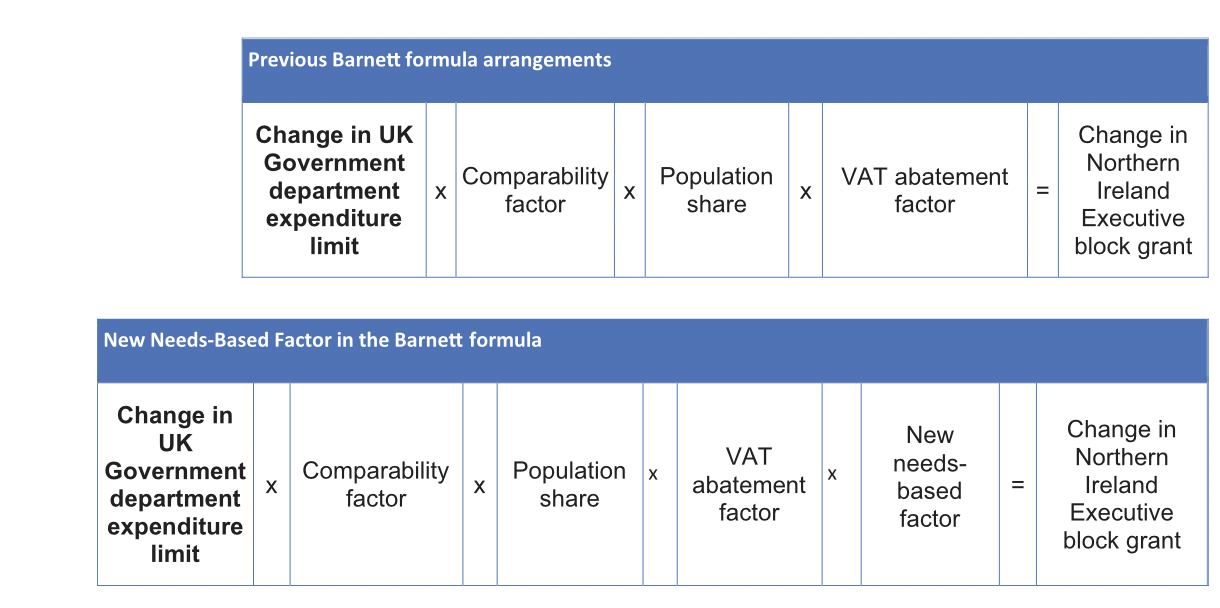Executive spending rules adjusted for social need

The Department of Finance has formally published an interim fiscal framework which mandates per capita public spending in Northern Ireland to be 124 per cent of that in England, in line with recommendations made by the Northern Ireland Fiscal Council.
The UK Government and Northern Ireland Executive reached an interim agreement in May 2024 for the inclusion of a new needs-based factor in the Barnett formula for Northern Ireland to determine changes to the Executive’s block grant funding.
The needs-based factor of 24 per cent, based on a range suggested in a report by the independent Northern Ireland Fiscal Council, will apply from the 2024/25 financial year to new Barnett consequentials arising since the Executive was restored in February 2024
The fiscal framework report states that UK Government will “consider a review of Northern Ireland’s relative need” if multiple independent and credible sources provide evidence that relative need is different to 124 per cent.
In the event that the Northern Ireland Executive’s funding relative to UK Government spending in England falls below its relative need of 124 per cent, the fiscal framework outlines that the needs-based factor in the Barnett formula will be set at 24 per cent.
If the Northern Ireland Executive’s funding is above its relative need of 124 per cent, there will be a transitional needs-based factor of 5 per cent, mirroring the approach in the Welsh Government’s Fiscal framework. For this purpose, funding from the restoration financial package is excluded from the relative funding calculation.
At the relevant Spending Review, The UK Treasury has agreed to review and discuss the Northern Ireland Executive’s funding approach, including concerns about 2026/27 funding.
Funding under the Executive Restoration financial package
Since the 2024 Northern Ireland Executive Restoration financial package was published in February, the UK Government has provided funding to the Northern Ireland Executive as follows:
- £846 million at supplementary estimates 2023/24 which can be used to “support public services and address pressures including pay” (the Executive has announced public sector pay increases on average of 4 per cent);
- £520 million at main estimates 2024/25 for “stabilisation of public services”;
- £34 million at main estimates 2024/25 to “tackle health waiting lists”; and
- £94.6 million at main estimates 2024/25 “un-ringfenced funding”.
Capital borrowing
The Northern Ireland Executive has undergone a number of years of overspend due to the lack of devolved government between 2022 and 2024, which has resulted in £559 million of debt incurred over the 2022/23 and 2023/24 financial years.
Under previous Barnett Formula rules, the Northern Ireland Executive can currently borrow up to £200 million capital per year within a £3 billion overall cap on outstanding debt. These limits are fixed in cash terms.
Under the revised rules, the Northern Ireland Executive’s annual limit will now increase by 10 per cent in 2024/25 to £220 million. This limit will then increase annually in line with inflation from 2025/26 onwards using the GDP deflator and 2024/25 prices.
New sustainability plan to be published in August
Announcing the new framework, Minister of Finance Caoimhe Archibald MLA said: “Following intensive and constructive negotiations with the Treasury and approval from the Executive, this agreement marks substantial progress on the position within the financial package, with a firm commitment to review the Executive’s funding before the cliff edge in 2026/27.
“Importantly it also recognises the Executive will continue to plan on the assumption that it will be funded at or above the 124 per cent level of relative need in future financial years.
“In addition, Treasury has agreed to the 124 per cent needs-based adjustment factor being applied from the date of restoration of the Executive. This means some £24 million from the Spring Budget Barnett consequentials will now be available for allocation as part of the upcoming June monitoring round.
“Any future Barnett in 2024/25 will be at this increased level meaning additional funding for public services. The Treasury has also agreed to consider a review of the Executive’s relative need if multiple independent and credible sources provide evidence that relative need is different to 124 per cent.”
The publication of the Interim Fiscal Framework includes the scope and structure of the sustainability plan which will be published before the end of August 2024.
When asked by agendaNi on the prospect of the rules being adjusted in light of the election of a new government in Britain, a spokesperson from the Department of Finance said: “The interim fiscal framework commits both the British Government and the Executive to agreeing a final fiscal framework, which will build on the interim framework, to ensure the Executive has the funding arrangements and fiscal levers necessary to deliver sustainable public finances and public services for people here.
“The Minister has had positive introductory meetings with both the Chancellor and the Chief Secretary of the Treasury. In the meetings the Minister outlined the challenging financial situation here and her commitment to forging a strong working partnership with the Treasury.”






